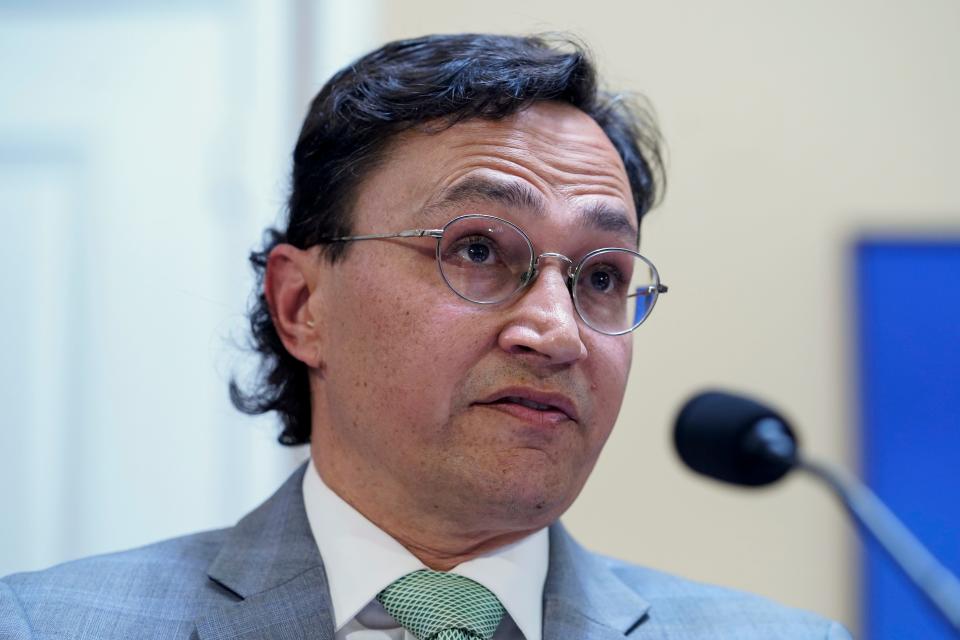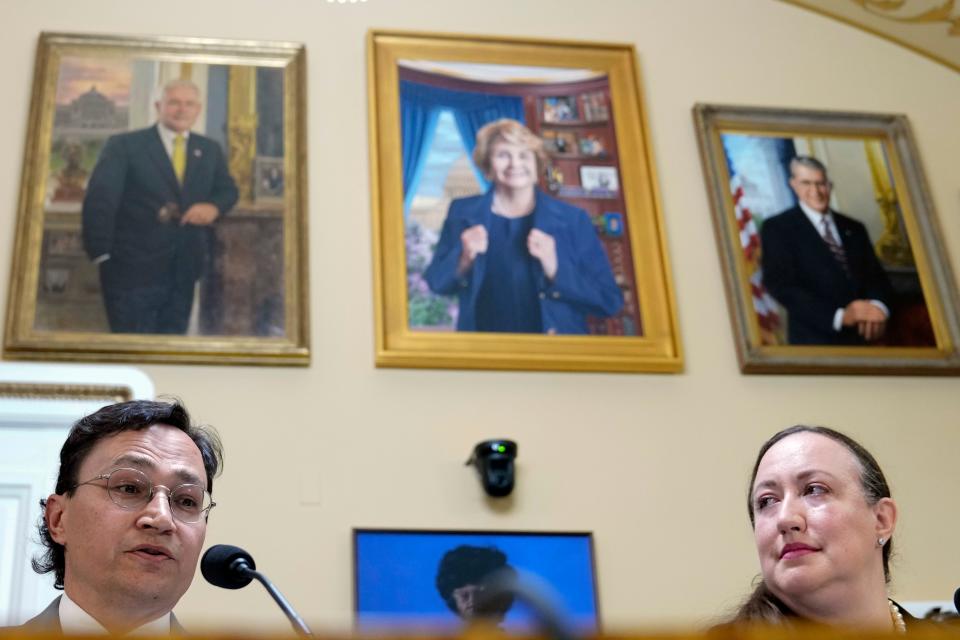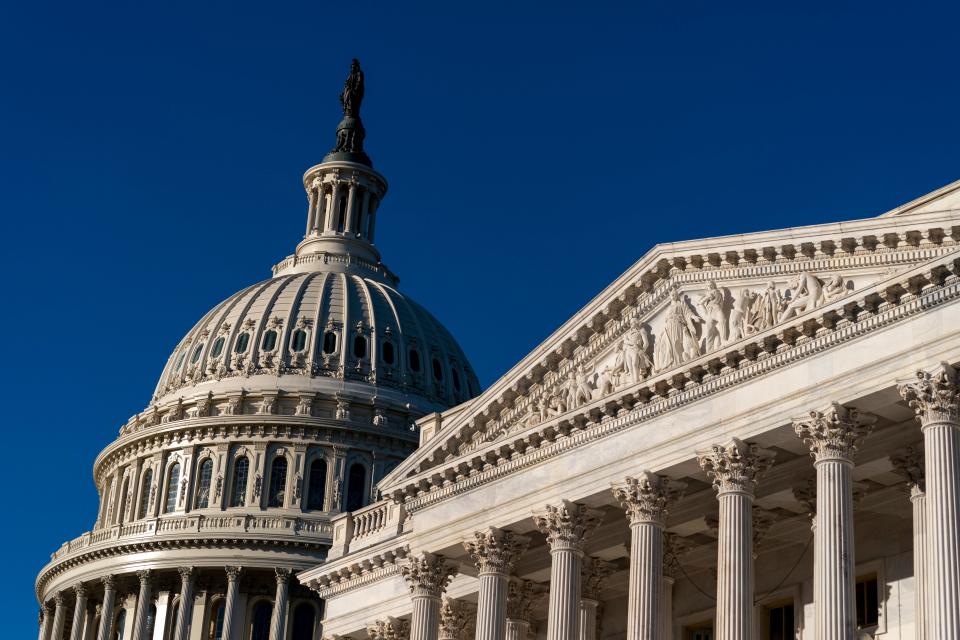The Cherokee Nation was promised a voice in Congress 187 years ago. It may finally happen
Now is the time to seat a Cherokee Nation delegate in Congress, the tribe’s principal chief told U.S. House lawmakers at a historic hearing Wednesday.
Federal officials promised the tribal nation a delegate in exchange for ceding its homelands and relocating west on the Trail of Tears. That may finally happen nearly 200 years later.
“It’s time for this body to honor this promise and seat our delegate in the House of Representatives,“ Principal Chief Chuck Hoskin Jr. said. “No barrier, constitutional or otherwise, prevents this.“
Hoskin said he was speaking not only on behalf of the Cherokee Nation's 440,000 citizens today, but the millions of ancestors who came before them. A guarantee that the Cherokee Nation would have a voice in Congress was critical before the tribal leaders agreed to the Treaty of New Echota in 1835, Hoskin said.
Tribal courts now have more power over non-Native defendants: Here's how the law changed
Hoskin and other Cherokee leaders renewed pressure on Congress to fulfill its treaty obligation three years ago. Wednesday’s hearing, held by the House Rules Committee, was the culmination of that campaign.
If House lawmakers approve the plan, the Cherokee delegate would become the first delegate to represent a tribal nation in Congress, giving the Cherokee Nation a vocal champion to introduce and influence legislation.

What happened at the hearing to seat a Cherokee Nation delegate in Congress?
Hoskin urged lawmakers on the House Rules Committee to quickly seat a Cherokee delegate. The leading committee member, Rep. Jim McGovern, D-Mass., expressed support for the delegate and said Congress should quickly act.
“The history of this country is a history of broken promise after broken promise to Native American communities,“ McGovern said. “This can not be another broken promise.“
He acknowledged that seating a tribal delegate raised complex questions because there was no precedent, but said he believed the plan could achieve bipartisan support.

Rep. Tom Cole, the top Republican on the committee, described the hearing as a historic first step, but said lawmakers still need to work through many questions before taking decisive action. Cole, who represents Oklahoma's 4th Congressional District, is a Chickasaw Nation citizen who co-chairs the Congressional Native American Caucus.
“I always say Native American issues aren’t and never should be partisan issues,“ Cole said. “In this case, it’s an institutional issue. It’s an issue of sovereignty. It’s an issue of trust obligations.“
After House lawmakers grapple with those issues, they can move forward to act, he said.
“It’s never too late to do the right thing,“ Cole said. “It’s not as if something that happened 150 or 170 years ago can’t be addressed and corrected now.“
Tribes are pursuing mobile gaming. Will that usher in sports betting to Oklahoma?

Who will serve as the Cherokee Nation delegate to Congress?
The Cherokee tribal council appointed tribal citizen Kim Teehee to serve as the tribal nation’s delegate. Teehee is a former White House tribal affairs adviser and legislative staffer. She attended Wednesday’s hearing, sitting behind Hoskin with other Cherokee dignitaries.
Cole heralded Teehee’s experience and qualifications to serve in the House. “If anybody doesn’t think she is qualified to be here, doesn’t know her way around the buildings — we could have her leading tours to the new freshmen that are coming up and advise them on what committees they should be on,“ he said.
Chickasaw Nation starts licensing hunters: What to know about tribal hunting licenses in Oklahoma
Does the effort to seat a Cherokee Nation delegate face any pushback?
Lawmakers raised several concerns, including that leaders of other tribes have suggested they should also receive delegates. The Choctaw and Delaware nations, both based in Oklahoma, signed treaties that refer to Congressional delegates, though the wording is not as direct as in the Treaty of New Echota.
Two additional tribes related to the Cherokee Nation, the United Band of Keetoowah Indians in Oklahoma and the Eastern Band of Cherokee Indians in North Carolina, have also asked for their own delegates because they believe they are also living parties to the Treaty of New Echota. The Cherokee Nation disputes that.
McGovern said lawmakers should investigate all of treaty obligations, while separately moving forward on a path to seat a Cherokee Nation delegate.
Cole said lawmakers have also received questions about dual representation, because Cherokee Nation citizens who live in the United States are also represented by House lawmakers who represent their geographical home base.
Both Hoskin and Lindsay Robertson, a law professor who formerly advised two Oklahoma governors on tribal affairs, pointed to a key distinction between delegates and representatives. Delegates can not vote on final versions of bills that make it to the House floor.
What powers would a tribal delegate to Congress have?
Although delegates cannot vote on final bills, they can introduce bills, make speeches and take part in committee hearings.
Congress has never appointed a delegate from a tribal nation. But there are six other non-voting members of the House. Those delegates represent American Samoa, the Commonwealth of the Northern Mariana Islands, the District of Columbia, Guam, Puerto Rico and the Virgin Islands.
What are the next steps to seat the delegate?
House lawmakers could seat a Cherokee Nation delegate by voting to amend the chamber’s rules, which is why the Rules committee held the hearing. Hoskin said he would like to see that vote happen by the end of the year, before the balance of Congress shifts in January as a result of the midterm elections.
The delegate rule change would need to be reapproved every two years with the start of each new Congress. Hoskin said he doesn't think lawmakers would ever backtrack if they move forward with seating a delegate.
“If the United States, at long last, after nearly two centuries, agrees to honor this promise, in this Congress — and it could happen this year — I would think it would be breathtaking for the next Congress to say we’re going to then break this promise,” Hoskin said. “Now, I’m a tribal leader. I know my history. I know the United States has broken a promise or two … But I think in the 21st century, when this House of Representatives seats Kim Teehee, there won’t be another Congress that will dare break that promise.”
Molly Young covers Indigenous affairs for the USA Today Network's Sunbelt Region. Reach her at mollyyoung@gannett.com or 405-347-3534.
This article originally appeared on Oklahoman: What to know about the push for a Cherokee Nation delegate in Congress

